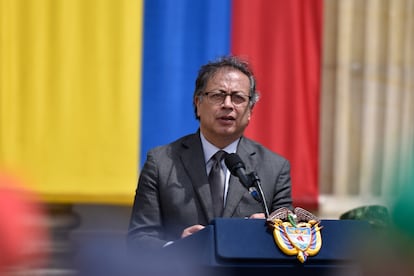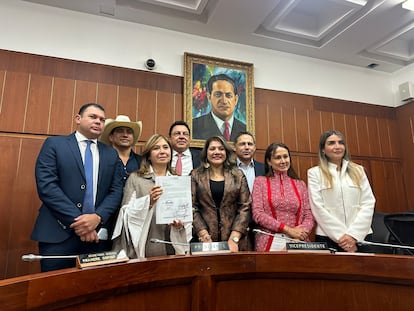Petro declares war on Congress after collapse of his flagship initiative
President accuses senators of torpedoing healthcare reform after having received foreign money

Gustavo Petro was enthused by Pedro Castillo’s ascension in Peru. The story could be a Julio Ramón Ribeyro plot: a primary school professor, son of enslaved farmers that General Juan Velasco set free, who was brought up in an Andean town that sits more than 13,000 feet above sea level. Castillo began to convene political events in the town squares of remote communities, and little by little, began to generate momentum that eventually brought him to the Casa de Pizarro, the Peruvian presidential residence. There, he sat in an office behind a mahogany desk, surrounded by busts of national heroes, an atmosphere that unnerved him. He missed milking the cows and feeding corn to chickens. He tried to govern, but his initiatives clashed with Congress. He couldn’t even get approval to travel abroad. Little by little, he was poisoned by the idea that the powers that be were trying to trip up a humble man like him. The day came when he erupted. In a televised address, he declared a state of emergency and ordered the dissolution of the legislature. This was political suicide, lacking the support of the military, business leaders and the people themselves. He was alone. Over the next few hours, he was arrested and imprisoned and is now locked up in prison, where his brother brings him bags of food to cook on a small stove.
The president of Colombia sympathizes with Castillo’s plight. Petro made excuses for his actions, despite the fact that it was clear that Castillo had attempted a self-coup d’état. He was replaced by his vice president, whom Petro considers a usurper. In the Palacio de Nariño, Petro met with Castillo’s Argentinean lawyer and told him that they had his support. Petro argue that the teacher was elected by the people and that Castillo’s mandate was stolen from him. Petro does not give much importance to the fact that Castillo was erratic, absolutely incapable. In his eyes, the Peruvian people had voted for him, and he had the right to rule. Castillo’s clash with Congress drove him mad, led him to take desperate measures. But Castillo had no regard for institutions or democratic functioning, according testimony from his own cabinet members. Petro’s political stature is doubtlessly different, and he has always respected institutional protocol. But now, there is something that links him with Castillo: a full-on clash with Congress. At the beginning of his administration, the president negotiated his way to a few victories. But even these were somewhat diluted, and today, his war with the legislature is total. Petro, who does not shy from Biblical references, made accusations of Congress on Thursday that recalled Jesus’s words against the Pharisees.
A healthcare reform initiative that failed on Wednesday has unleashed Petro’s demons. Wounded by the fall of his administration’s most important proposal, the president claimed that senators who voted against the proposal did so because they had received money from Keralty, a multinational corporation that owns the insurer EPS Sanitas, which was recently taken over by the state health system. “We were defeated by no small number of legislators financed by foreigners. We were defeated by a flagrant violation of the constitution and the law. However you look at it, public health resources financed campaigns, or foreign resources financed campaigns and parties,” the president wrote on social media network X. And, he added, “This is forbidden by the constitution and the law. It is of immense danger for Colombian democracy, because it signals not just the corrupt privatization of politics, but also the loss of national sovereignty.”

Petro’s harsh statements evoked an immediate reaction from Senate president Iván Name. In a speech, he defended senators and asked the president for respect. “The statement from President Petro is unacceptable. According to him, the Seventh Committee of the Senate of the Republic decided to shelve the healthcare reform law due to illegal and corrupt influences.” In addition, Name said that Petro’s declarations were “slanderous and libelous,” and constituted an attack on the dignity of the legislators. He reminded Petros that the senate committee that sank the healthcare reform approved his pension reform a few months ago. The senator issued a final warning: “Continuing to raise one’s voice against our members of Congress will only contribute to the deterioration of harmonious relationships between the branches of political power.”
Lawyer and University of the Andes professor Ramiro Bejarano says that, for the good of democracy, the Senate should not accept Petro’s “incredibly serious” accusation: “A dignified Senate would refuse to deliberate and legislate until Petro recants.” That would mean taking things to the next level of conflict. The president has not stood idly by while his reform was being defeated, taking control of the country’s two largest EPS public-private health entities — who are intermediaries between the state and hospitals — both of which he wishes to put out of business. He sees them as for-profit organizations, and that through them, part of the money that should be invested in healthcare ends up in the hands of business executives. Petro has seized on the fact that these companies do not have sufficient funds to act as insurers. Name also spoke harshly regarding the president’s policy of implementing reforms by force. “I deeply regret the intervention of EPS Sanitas and Nueva EPS, they enjoy a wide prestige among Colombians and cover more than 15 million individuals. We will thoroughly review the causes that led to the takeover of these entities,” said the Senate president in a brief speech.
The showdown between Petro and Name has gone through various phases, and kicked off the day that Name was elected as Senate president. Among the Alianza Verde [in English, Green Alliance]’s four candidates for the most important position in the legislative branch, Name was, ideologically, the most distant from the Petro’s administration, and represents the most traditional, cronyist kind of politicians, who have opposed the president’s reforms most vehemently. Name was elected thanks to the votes of all opposition parties, including those of Centro Democrático [Democratic Center] and Cambio Radical [Radical Change], winning over Angélica Lozano, who had been supported by Petro.
From that moment on, Name has insisted that the president’s reforms will not be approved by Congress in their original form. A few weeks ago, after learning of Petro’s proposal to create a Constituent Assembly, Name said during a Senate plenary session that the president was a “threat the democracy and Congress.” At that point, he challenged Petro to use institutional methods to create the Constituent Assembly, as is his constitutional mandate, rather than town councils and popular committees. “President, bring us the law that would convene a national Constituent Assembly, as is the constitutional mandate, do not invent methods that we do not accept. Do not debase democracy,” he said, threateningly. He concluded the speech with a warning: “The weapons of our armed forces belong to the nation, not to a government administration; just in case you are thinking about rattling the sabers.”
Hours later, the president responded in a speech delivered from the capital of the Colombian state of Córdoba, Montería: “The president of Congress need not fear the nation’s weapons, because right now, I am the commander and chief. The nation’s weapons will never be pointed at the people, nor Congress.” This was a more conciliatory Petro, though he made it clear who was in charge, that he is the commander-in-chief, which explains why he had been wearing the presidential military headwear that had aroused so many speculations. His confrontation with Congress was just beginning. The clash promises to be tremendous.
Sign up for our weekly newsletter to get more English-language news coverage from EL PAÍS USA Edition
Tu suscripción se está usando en otro dispositivo
¿Quieres añadir otro usuario a tu suscripción?
Si continúas leyendo en este dispositivo, no se podrá leer en el otro.
FlechaTu suscripción se está usando en otro dispositivo y solo puedes acceder a EL PAÍS desde un dispositivo a la vez.
Si quieres compartir tu cuenta, cambia tu suscripción a la modalidad Premium, así podrás añadir otro usuario. Cada uno accederá con su propia cuenta de email, lo que os permitirá personalizar vuestra experiencia en EL PAÍS.
¿Tienes una suscripción de empresa? Accede aquí para contratar más cuentas.
En el caso de no saber quién está usando tu cuenta, te recomendamos cambiar tu contraseña aquí.
Si decides continuar compartiendo tu cuenta, este mensaje se mostrará en tu dispositivo y en el de la otra persona que está usando tu cuenta de forma indefinida, afectando a tu experiencia de lectura. Puedes consultar aquí los términos y condiciones de la suscripción digital.








































